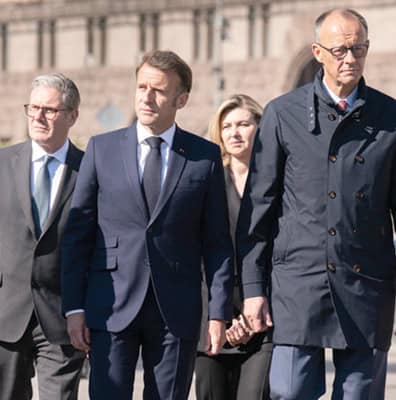 I’ve just returned from Europe and my heart is deeply stirred for that continent and its people. My children and grandchildren live there. I myself lived in Europe for 25 years of my adult life, across more than 20 countries. From what I can see, there is a growing awareness that Europe now faces challenges unlike anything since the Second World War. Decades of prosperity and peace have left the continent emasculated and unprepared. And now, almost suddenly, it finds itself confronted with a ruthless, unyielding adversary in the leader of Russia.
I’ve just returned from Europe and my heart is deeply stirred for that continent and its people. My children and grandchildren live there. I myself lived in Europe for 25 years of my adult life, across more than 20 countries. From what I can see, there is a growing awareness that Europe now faces challenges unlike anything since the Second World War. Decades of prosperity and peace have left the continent emasculated and unprepared. And now, almost suddenly, it finds itself confronted with a ruthless, unyielding adversary in the leader of Russia.
Oh, that Europe had at least one leader like Winston Churchill today—whose iron will was perhaps the single greatest factor in saving Europe from Hitler, and who later did what he could to limit Soviet Russia’s exploitation of Germany’s defeat. I earnestly hope that today’s European leaders will rise to the occasion and discover within themselves the courage and resolve to unite against their common foe, Putin.
But will they? That is the question. Because it will take more than strong national leadership. Generations of peace seldom prepare a people to quickly stand in defense of their nations when an enemy is at the gate. I almost shudder to imagine what it would mean if today’s fighting-age men of Europe were suddenly called upon to stand alongside Ukrainians against the relentless “meat grinder” waves of Russian soldiers that Putin sends to their deaths in pursuit of what he calls Russia’s glory.
And yet, I see glimmers of hope. To be frank, I am not “woke.” That ideology has plagued Europe for years, and in fact Putin has at times gained ground by portraying Russia as a defender of Christianity against what he calls the moral decline of Brussels and the spread of gender ideology. Across Europe, however, there are growing movements often labeled “far right” or “nativist.” In truth, many of these movements reflect ordinary people who are  simply fed up with the godless, secular “progressive” wave that has steadily undermined traditional—and often Christian—values in nearly every European country.
simply fed up with the godless, secular “progressive” wave that has steadily undermined traditional—and often Christian—values in nearly every European country.
Britain is a vivid example. In some places, local councils have gone so far as to order police to stop people from flying the Union Jack, Britain’s flag, on their own property! Meanwhile, others are arrested merely for standing silently across the street from abortion clinics. Such measures show just how far things have gone astray.
But the backlash is growing—the “natives are restless,” as the saying goes. It reminds me of the story of the boiling frog: slowly turn up the heat, and the frog won’t notice until it’s too late. But across Europe, many frogs are noticing—and they’re deciding to act. I find that encouraging.
Still, the reality remains: the enemy is at the gate—at several gates, in fact. Will there be a deliverer? From the top to the bottom, across the continent Europe needs… well, it needs God perhaps like never before. Will Europe’s leaders and people return to the values and convictions that sustained them through centuries of hardship? Or will this be one of those times when dark forces prevail and civilization retreats?
One way or the other, I believe a remnant of the people of faith will remain in Europe, as they have in one form or the other since Roman times. I find consolation in that. But for me, it is a sad, ominous, foreboding time and I do hope and pray for a better outcome in these things than what seems to be unfolding before us.
 A famous phrase from at least the time of Rome said, “Whom the gods would destroy, they first make mad”. Does it apply to now? Is God preparing to destroy parts of the world and so is allowing them to descend into madness so that they bring on their own destruction? To say the least, it’s happened before. The Latin rendition was, “Quos Deus vult perdere prius dementat,” an opinion that’s been around for centuries.
A famous phrase from at least the time of Rome said, “Whom the gods would destroy, they first make mad”. Does it apply to now? Is God preparing to destroy parts of the world and so is allowing them to descend into madness so that they bring on their own destruction? To say the least, it’s happened before. The Latin rendition was, “Quos Deus vult perdere prius dementat,” an opinion that’s been around for centuries. And one came forth and said, ‘I will go forth and be a lying spirit in the mouth of his prophets’. And the Lord said, ‘Go, you shall persuade him’.
And one came forth and said, ‘I will go forth and be a lying spirit in the mouth of his prophets’. And the Lord said, ‘Go, you shall persuade him’.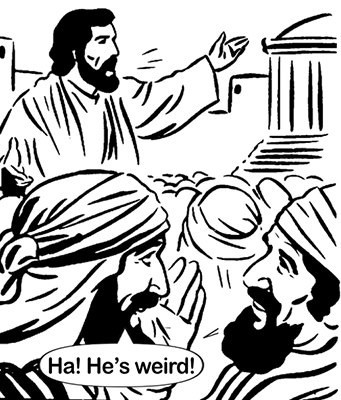 “
“ It wasn’t a dream, but a strong, vivid experience—just before I woke up. There was a lucid presence, and it felt more like me than I was. So persuasive, so reasonable, and so overwhelming.
It wasn’t a dream, but a strong, vivid experience—just before I woke up. There was a lucid presence, and it felt more like me than I was. So persuasive, so reasonable, and so overwhelming.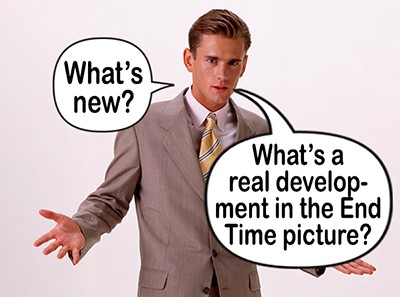 I scan the horizon daily for “the signs of the times”. Some things have been there for years. But, what’s new? What’s now in view that indicates progress toward the very final end time foreseen in the Bible?
I scan the horizon daily for “the signs of the times”. Some things have been there for years. But, what’s new? What’s now in view that indicates progress toward the very final end time foreseen in the Bible?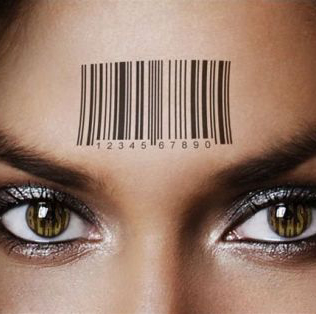 They may not believe it but many millions have come to know the ideas behind the verse that says of a future point in time, “
They may not believe it but many millions have come to know the ideas behind the verse that says of a future point in time, “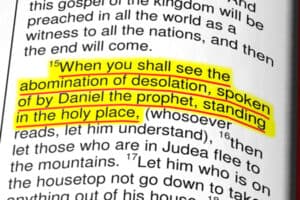 Don’t worry if you don’t understand it, I’m not sure anyone yet has a complete, total grasp of how this will be fulfilled. Jesus said, “
Don’t worry if you don’t understand it, I’m not sure anyone yet has a complete, total grasp of how this will be fulfilled. Jesus said, “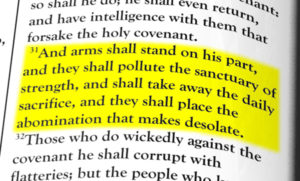 “Mark! Mark! I have it! The abomination of desolation is the Anti-Christ!”
“Mark! Mark! I have it! The abomination of desolation is the Anti-Christ!” What’s the image of the beast, you ask? It becomes fascinating when we find that the word “image” in the Bible is often referring to an idol, just as the word “abomination” did in the Old Testament. If you do a Word study on those two words, “abomination” and “image”, you’ll see how many times they are referring to what we today call idols.
What’s the image of the beast, you ask? It becomes fascinating when we find that the word “image” in the Bible is often referring to an idol, just as the word “abomination” did in the Old Testament. If you do a Word study on those two words, “abomination” and “image”, you’ll see how many times they are referring to what we today call idols.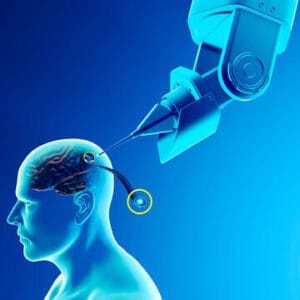 And this falls into the realm of reality since we all know just how fast and how far technology is advancing in those fields. Elon Musk is creating bio chips to link our brains into a mega-network that may bring on forms of bio-technical eternal life.
And this falls into the realm of reality since we all know just how fast and how far technology is advancing in those fields. Elon Musk is creating bio chips to link our brains into a mega-network that may bring on forms of bio-technical eternal life.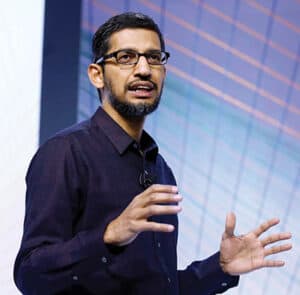 I’ll end this with just a few of the quotes I’ve taken note of in the New York Times articles that have come out about this. Here’s one.
I’ll end this with just a few of the quotes I’ve taken note of in the New York Times articles that have come out about this. Here’s one. There was almost no fear greater than the fear of Russia. But now Putin’s had to (as they say in poker), “Put what you’ve got on the table.” And it hasn’t looked good so far. No one expected Ukraine to be able to withstand Russia. But they have.
There was almost no fear greater than the fear of Russia. But now Putin’s had to (as they say in poker), “Put what you’ve got on the table.” And it hasn’t looked good so far. No one expected Ukraine to be able to withstand Russia. But they have. New and stranger goings on proceed briskly in the secular nation of Israel in the Middle East. Will the new, ultra religious government there clear the way for the building of the Third Temple in Jerusalem? And artificial intelligence meanwhile is gathering pace by leaps and bounds; some now predict that “
New and stranger goings on proceed briskly in the secular nation of Israel in the Middle East. Will the new, ultra religious government there clear the way for the building of the Third Temple in Jerusalem? And artificial intelligence meanwhile is gathering pace by leaps and bounds; some now predict that “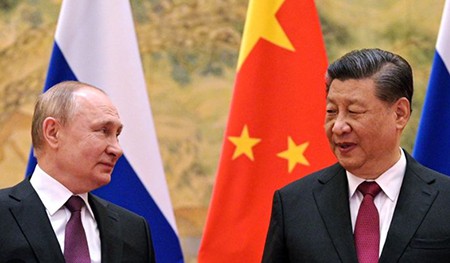 And the latest fear is that China will come to the aid of Russia with an infinity of weaponry, matching what the West is giving Ukraine. My, how that would be an unfathomably ominous turn of events in this saga. Would that not bring us face to face with the full scenario of World War III that was so before us at the height of the Cold War?
And the latest fear is that China will come to the aid of Russia with an infinity of weaponry, matching what the West is giving Ukraine. My, how that would be an unfathomably ominous turn of events in this saga. Would that not bring us face to face with the full scenario of World War III that was so before us at the height of the Cold War?